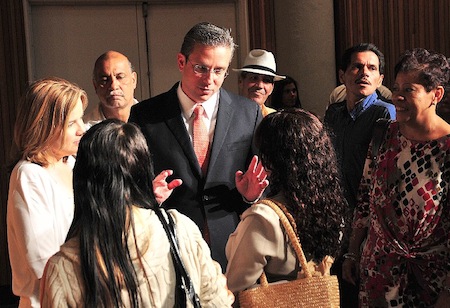Although voters in the United States chose to retain a Republican House of Representatives, a Democratic Senate and a Democratic president in Barack Obama, it wasn’t as good a night for incumbents in the Commonwealth of Puerto Rico.![]()
![]()
Alejandro García Padilla (pictured above), a Puerto Rican senator, narrowly defeated Puerto Rico’s governor Luis Fortuño in Tuesday’s Puerto Rican gubernatorial election and Fortuño conceded the race earlier this afternoon — with over 96% of the votes counted, García Padilla leads with 47.85% to just 47.04% for Fortuño.
The result will cap what was generally a good night for García Padilla’s Partido Popular Democrático de Puerto Rico (the PPD, Popular Democratic Party of Puerto Rico), which also took back control of Puerto Rico’s Asamblea Legislativa (Legislative Assembly) from Fortuño’s Partido Nuevo Progresista de Puerto Rico (the PNP, New Progressive Party of Puerto Rico), and which also won the mayoral race in San Juan, Puerto Rico’s capital and largest city.
So who is García Padilla? And how will García Padilla will his administration differ from Fortuño’s?
García Padilla, age 41, an attorney and former law professor, was elected to Puerto Rico’s Senate in 2008 as the PPD’s most popular vote-winner. He previously served as the secretary of consumer affairs under former PPD governor Aníbal Acevedo Vilá from 2005 to 2008.
García Padilla’s victory first and foremost likely means an end to the austerity policies of his predecessor.
As governor, Fortuño has essentially eliminated Puerto Rico’s $2 billion budget deficit, but he’s done so by cutting public sector jobs and reducing spending on higher education, even while he reduced taxes 50% for individuals and 30% for business. The implementation of his economic program has drawn considerable attention in the United States, and Fortuño himself is somewhat of a star within the Republican Party — he and his wife had primetime speaking roles during the Republican National Convention in August. If Mitt Romney had won Tuesday’s U.S. presidential election, it seemed likely that Fortuño could even be elevated to a cabinet position in a Romney administration.
Fortuño, already on the ropes after losing two referenda earlier in the summer to reduce the number of legislators in Puerto Rico’s legislative assembly and to give judges the right to deny bail in certain murder cases (Puerto Rico, uniquely, entitles everyone to bail regardless of the crime), was never quite a favorite for reelection.
García Padilla ran a stinging campaign against the harshness of Fortuño’s austerity measures in the face of an economic climate even more troubling than on the U.S. mainland — the economy has been in recession for six years, unemployment remains relatively high at 13.6% and the poverty level has reached a staggering 45.6%. Meanwhile, crime is rising steadily, with over 1,000 murders in 2011 alone. Puerto Rico’s GDP per capita of just around $24,000, about half that of the United States, makes it already much less prosperous than the mainland. Continue reading Who is Alejandro García Padilla?
